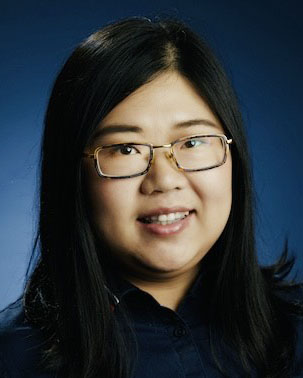ARM Welcomes New Hires to Support Data Analysis and Quality
Published: 24 August 2023
The Atmospheric Radiation Measurement (ARM) user facility recently added new staff to help support the analysis of ARM measurements and develop new data quality tools.
Data Analysis

ARM has three new data analysts—Israel Silber, Jingjing Tian, and Peng Wu—who are all earth scientists at Pacific Northwest National Laboratory (PNNL) in Washington state.
Silber joined PNNL in June 2023 from Pennsylvania State University, where he spent the past two years as an assistant research professor in meteorology and atmospheric sciences. He joined Penn State in 2016 after earning his PhD in geophysical, atmospheric, and planetary sciences from Tel Aviv University in Israel.
In his research, Silber focuses on cloud processes, their role in the climate system, and their representation in large-scale models. Since 2018, he has led or co-written 21 papers using ARM data, with an emphasis on polar clouds. He is a co-investigator for ARM’s ongoing Eastern Pacific Cloud Aerosol Precipitation Experiment (EPCAPE), which concludes in February 2024 in La Jolla, California.

In July 2023, Tian returned to PNNL, where she evaluated mesoscale convective systems in the Weather Research and Forecasting model as a visiting researcher in summer 2018. After getting her PhD in atmospheric sciences from the University of Arizona, she joined Lawrence Livermore National Laboratory in California as a postdoctoral researcher in 2019 and moved up to a staff scientist position in 2022.
Over the past decade, Tian has used ARM data to develop algorithms for estimating cloud and rain microphysics in convective clouds, identify shallow cumulus clouds with satellite observations, determine the strengths and deficiencies of simulated clouds and precipitation in the Simple Cloud-Resolving E3SM Atmosphere Model (SCREAM), and enhance lidar-radar simulators to bridge the gap between global climate models and ARM ground-based cloud observations.

Wu, who received his PhD in atmospheric sciences and meteorology from the University of Arizona, has been at PNNL since 2020.
A large portion of Wu’s research focuses on cold-air outbreaks using surface and satellite remote sensing, as well as numerical model simulations. Wu co-authored a 2022 overview article on ARM’s Cold-Air Outbreaks in the Marine Boundary Layer Experiment (COMBLE) in the Bulletin of the American Meteorological Society.
ARM will tap the trio’s expertise in the following areas:
- Silber: cloud microphysics, remote-sensing retrievals, instrument simulators
- Tian: radar and satellite remote sensing of clouds and precipitation, land-atmosphere-cloud interactions
- Wu: cloud physics, remote-sensing retrievals, model-observation evaluation.
Data Quality

In April 2023, the ARM Data Quality Office welcomed Mia Li, a machine learning software developer at the Cooperative Institute for Severe and High-Impact Weather Research and Operations (CIWRO) at the University of Oklahoma. She is responsible for building machine learning solutions to detect anomalies in ARM data.
Previously, Li worked as a building information modeling specialist at Harper Construction Co. in San Diego, California.
Keep up with the Atmospheric Observer
Updates on ARM news, events, and opportunities delivered to your inbox
ARM User Profile
ARM welcomes users from all institutions and nations. A free ARM user account is needed to access ARM data.


















